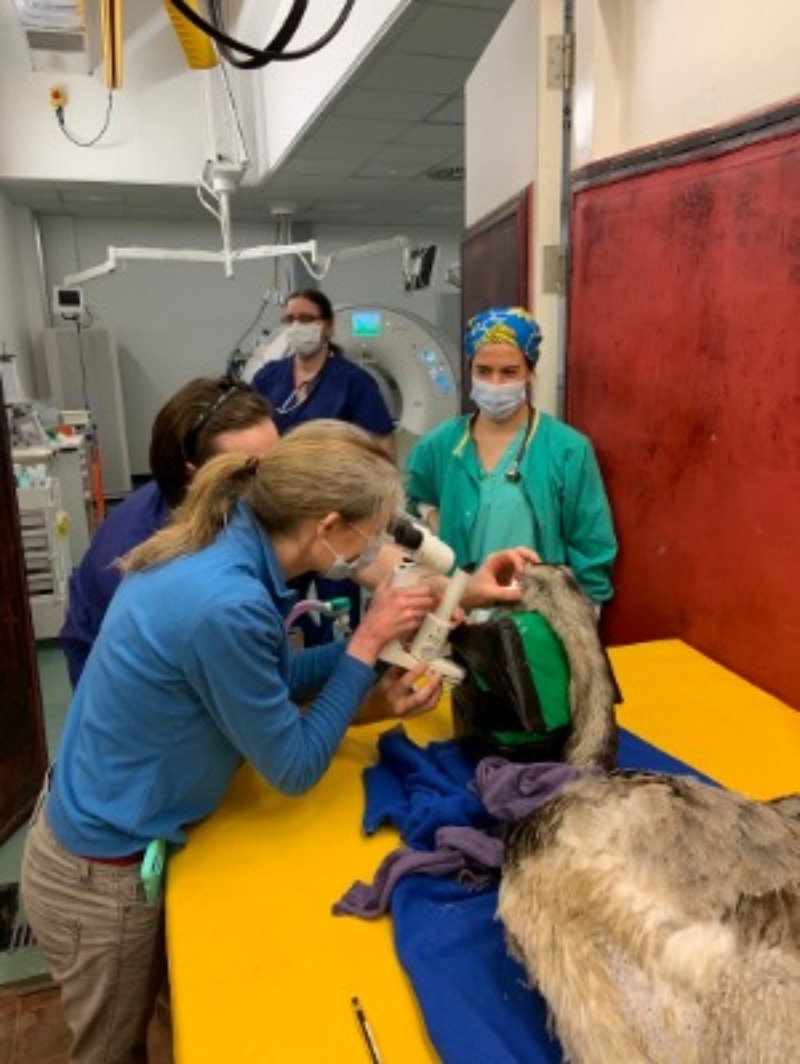Remarkable Rhea’s RVC Referral
Clinical Connections – Summer 2021
Vicki Baldrey, Lecturer in Exotic Species and Small Mammal Medicine and Surgery and Jo Hedley, Senior Lecturer in Exotic Species and Small Mammal Medicine and Surgery
George the pet rhea was presented to the RVC Exotics Service at the Queen Mother Hospital for Animals (QMHA) for assessment and treatment of left-sided periocular swelling. The Exotics Service runs weekly clinics at QMHA and often collaborates with the Ophthalmology and Imaging services on cases.
George was brought by trailer to the QMHA and was examined in a padded equine knock-down box. Her owner reported reduced vision and swelling around her left eye. A brief conscious ophthalmic examination revealed the menace response was present in the right eye and intermittent in the left eye. Dazzle reflexes were intact bilaterally. Further examination was limited by her temperament, so the team proceeded directly to anaesthesia for a full ophthalmic examination and further investigation. This allowed minimal stress to George, which is important, as rhea can suffer from capture myopathy with prolonged manual restraint.
After an initial ‘quad’ protocol comprising intramuscular butorphanol, medetomidine, ketamine and midazolam, George was anaesthetised with IV propofol via her basilic vein and then intubated and maintained on sevoflurane in oxygen.
Ophthalmic examination of the left eye revealed marked conjunctival hyperaemia. There was a soft mass in the medial aspect of the orbit, compressing the globe. The corneal examination was unremarkable. The anterior chamber was formed without aqueous humour flare. The pupil was round and mobile, and the lens was transparent. The fundic examination was unremarkable and the ophthalmic examination of the right eye was unremarkable. The intraocular pressure readings were 12 mmHg and 22 mmHg in the right and left eye, respectively.

Advanced Imaging
A CT was performed with IV contrast and revealed multiple pockets of fluid in the left periorbital sinus, with concretions of solid material with areas of mineralisation compressing the left globe. Ultrasound- guided fine needle aspiration was performed but yielded a limited amount of fluid. Following surgical preparation and instillation of 2mg/kg lidocaine, an incision was made over the swelling, into the dorsal aspect of the periorbital sinus and a large amount of caseous/mineralised material curetted out. The pocket was then copiously lavaged with sterile saline. Further pain relief was administered with IM meloxicam. At the end of the procedure, the medetomidine was antagonised with an equal volume of atipamezole IM. George made a smooth, rapid recovery and was standing within 15 minutes.
Samples from the sinus were submitted to the RVC laboratory for culture and sensitivity, cytology and histology. Cytology and histology revealed pyogranulomatous inflammation and thankfully no evidence of neoplasia. Culture grew two species of E. coli and an unidentified anaerobe. George was treated with oral marbofloxacin and metronidazole based on the bacterial sensitivity results.
After discharge George continued to improve. Antibiotics were continued for six weeks and she was very compliant in taking these in her favourite egg sandwich. The swelling has so far not recurred so we hope George will continue to do well.
The RVC’s Exotics and Small Mammals Service is the only specialist exotics service in central London and the only full-time exotics service at an English veterinary school. The team treats a wide variety of species, including rabbits and other small mammals, reptiles, birds, amphibians, ornamental fish and invertebrates. The service has been steadily growing since being established in 2014 and will soon expand further and comprise of six vets – including one new intern and one new resident – and six registered veterinary nurses. The team’s presence at the at the QMHA will be increasing from one to two days a week for referrals.
